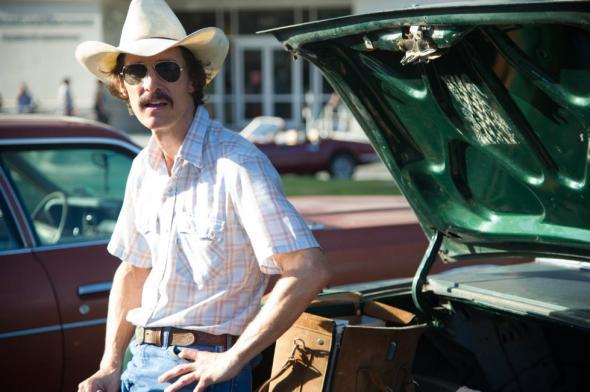In Dallas Buyers Club, which was nominated for six Academy Awards yesterday—including Best Picture, Best Actor, and Best Adapted Screenplay—Ron Woodroof, played by Matthew McConaughey, is depicted as a straight man and a bigot who gradually overcomes his own homophobia. In real life, many friends and acquaintances who were close to him say they never thought of him as homophobic or as heterosexual. So why is the hero of the movie straight?
When my colleague Aisha Harris spoke with the film’s original screenwriter, Craig Borten, in late October (Borten later worked with co-screenwriter Melisa Wallack), she asked him if Woodroof’s journey from homophobe to ally was true to life. Borten responded:
Yes homophobic—yes, his arc is real yet told in a dramatic way for the film and conveyed through his relationship through Rayon which is a composite character. Yes, the [Dallas club] and his diagnosis changed him.
In past interviews, Borten and the other filmmakers have insisted on the accuracy of the film’s portrayal of Woodroof, declaring it crucial to the integrity of the film. Interviewed in 2002 (the film has been in the works for more than 20 years), Borten told Variety that Woodroof was “as racist and homophobic as they come.” “It was so important to stay close to who Ron was,” said producer Rachel Winter.
Those who knew Woodroof were surprised when they saw him portrayed this way on the screen. In November, Arnold Wayne Jones wrote an article for the Dallas Voice, which stated that Woodroof “was not a homophobe … according to those who knew him, but rather openly bisexual.” This week I contacted one of Jones’ sources, Dr. Steven Pounders, who was Woodroof’s primary care physician. “I never witnessed any homophobia in the time I knew him from 1988 through his death in 1992,” Dr. Pounders told me. “He fit right in the gay environment without problems.” Was Woodroof straight? “Brenda, his ex-wife, stated that he was bisexual,” says Dr. Pounders. (“Brenda and he were married, then divorced, but they remained close until his death,” he explained.)
Bill Minutaglio, who followed and interviewed Woodroof for a six-page feature in Dallas Life magazine, agreed. “He was not homophobic,” he told me. “Far from it.” As for Woodroof’s sexuality, Minutaglio told me, “I don’t know if Ron was gay or bisexual, but he clearly had many friends and supporters in the gay community.”
At least one close acquaintance who spoke to the Sunday Times of London was more forceful. “When I found out they were making a movie about Ron, I went, wow, that’s great,” said Penny Krispin, a close friend of Woodroof’s who was also his nurse. “Then I read they were portraying him as a gay-hating straight guy, and I was blown away. That was not the Ron Woodroof I knew.” “Ron was one of my gay patients,” Krispin added. “I never knew anyone who thought Ron was straight.” The Times article also implies that Woodroof’s close friend Bill Seals, who was also HIV positive, may have been a lover. Seals is dead, according to William Waybourn, former president of the Dallas Gay Alliance, of which Ron was a member. “Although nobody I spoke to remembers Woodroof referring to Seals as his boyfriend,” wrote Times correspondent Tony Allen-Mills, “it was clear that the two men were close.” (The article, which was published in November without receiving much notice, is not available online.)
So why is the Woodroof of the movie straight? Craig Borten had a very different experience with Woodroof, according to his press agent. During Borten’s three days of interviews with him, Woodroof introduced another woman as a girlfriend, repeatedly said homophobic and racist things, and made repeated and graphic references to anal sex with women, according to the press agent. As for the question of whether Woodroof was bisexual, the press agent says it never came up.
Why would Woodroof behave so differently in his interviews with Borten? Perhaps he was not as open as some of his friends thought, and meant to give the screenwriter a different impression. Or perhaps he really did have some homophobia lingering inside him, even towards the end. Whatever the case may be, it seems that during the roughly 20 years Borten worked to get his story into production (often in collaboration with other screenwriters and with the input of producers), he gave Woodroof’s story a somewhat neater and simpler trajectory than it had in reality.
Even if his doctor and other associates were mistaken, and Woodroof was straight throughout his life, some may never be satisfied with the story Dallas Buyers Club chooses to tell. In Slate’s Movie Club, Mark Harris has accused the movie of presenting a “spurious and somewhat pandering version of gay history.” Most of the gay activists who fought for better AIDS treatment didn’t require any straight men to prompt them into action, as Harris has noted. When it comes to the complicated figure of Ron Woodroof, whether his story was an exception may remain an open question.
